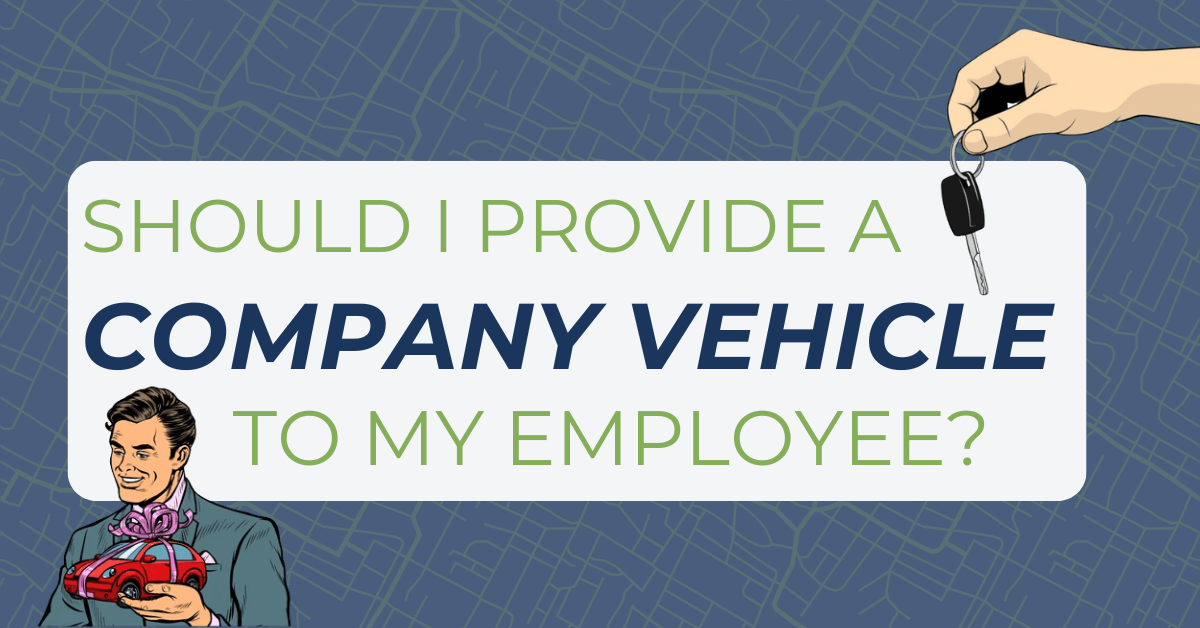Should I Provide a Company Vehicle to My Employee?
February 27th, 2025 | 3 min. read
By Matt Patrick

Back in the (cough, cough) ... 1990s, I interned at a firm in Montgomery, AL that offered an impressive perk: company vehicles. Managers received Jeep Cherokees and partners got Lexus sedans. Seeing all the Cherokees and Lexuses in the parking lot—well, I thought it was the coolest thing ever.
“One day,” I promised myself, “my company will do the same.”
There was just one problem: At the time, I had absolutely no idea how to provide company vehicles to employees.
The tax implications? Complete mystery.
Insurance requirements? No clue.
How it affected W-2s? Total blank.
Fast forward to today. This is a very common question our clients ask. And it makes sense. Offering company vehicles can be an impressive benefit that helps attract and retain top talent. Many small business owners want to offer company vehicles to employees, but the tax implications and liability concerns can be overwhelming. They also have questions like: can an employee use a company vehicle for personal use or is a company car worth it for an employee? Without proper planning, what seems like a great perk can turn into a compliance nightmare, leading to unexpected tax bills or insurance headaches.
Luckily, at Whirks, we’ve helped many businesses avoid tax and compliance pitfalls and confidently offer company vehicles as a benefit. So, before you start handing out keys like Oprah, let's break down what you need to know about the tax implications, insurance requirements, and compliance steps necessary to offer company cars to employees.
IRS Rules for Company Vehicles: What You Need to Know
The first rule of offering employee perks you need to understand is that if it has value, the IRS probably wants to tax it.
When providing a vehicle to an employee, you’ll need to choose between an accountable plan or a non-accountable plan. The best choice for you depends on how much administration you’re willing to handle and how the tax burden falls on you vs. your employees.
Both options have their trade-offs. Non-accountable plans offer simpler administration but can create a significant tax burden for employees. Accountable plans, while requiring more tracking and paperwork, have a much smaller tax impact on employees upfront. Let's take a closer look at each.
How Non-Accountable Plans Impact Taxes and Employees
With a non-accountable plan, the answer is straightforward. But it’s also potentially painful. The entire purchase price of the vehicle becomes taxable income to your employee immediately.
Imagine telling your star employee: “Good news! You’re getting a $40,000 company car. Bad news! You now owe taxes on an extra $40,000 of income.”
That’s a quick way to turn a generous perk into a financial burden.
A better alternative we’ve explored with clients is to have the employee purchase the car themselves and then reimburse the employee for the car note as a separate pay item. In one case, the employee found a zero-interest financing deal, which made it a win-win for everyone.
Accountable Plans Require More Paperwork but Offer Tax Benefits
An accountable plan means your employee regularly documents their business mileage. When employees use the vehicle for business purposes (excluding commuting), mileage reimbursements are not taxable. When they use the vehicle for personal reasons (including commuting), their mileage reimbursements are taxable and show up on their W-2.
The pros? Your employee doesn’t face a massive tax bill upfront.
The cons? You’ll need to track business vs. personal use, which equals more paperwork.
The good news is that technology can simplify the paperwork. Apps like MileIQ make mileage tracking and reporting easy.
But What About Partners or S Corp Shareholders?
If you’re providing a vehicle to a partner who is more than a 2% shareholder of an S Corp, the rules are a bit different.
With an accountable plan, personal use will be included on the partner’s K-1 (their share of business income) in a partnership and likely treated as a guaranteed payment. For a 2% shareholder, any personal use amount will be taxable on their W-2.
A Note on Insurance Requirements for Company Cars
Any company-owned vehicle must be covered by a commercial auto insurance policy, not a personal policy. While commercial insurance covers the vehicle during business use, it typically won't provide liability coverage when an employee uses the vehicle for personal reasons—even if driving to and from work.
You'll want to consult with your insurance agent for more information about specific coverage needs, limitations, and options for your situation.

Before You Hand Over Those Keys to a Company Vehicle
Company vehicles can be an incredible perk—I’ve seen the excitement firsthand when we’ve offered them to our team members. But there are also some key things to know to avoid any missteps.
Now that you have an idea of the tax and insurance considerations for providing a company vehicle, there are two important conversations you need to have before you start building your company fleet:
- Talk to your tax advisor about the tax implications for both your business and your employees.
- Consult your insurance agent about coverage requirements and liability issues.
The right approach depends on your specific situation and how much paperwork you’re willing to handle. But with proper planning, company vehicles can be a standout benefit that helps you find and keep a team of high performers.
Looking for more ways to offer attractive benefits that won’t break the bank? Check out our article on How to Build the Ideal Small Business Benefits Package.
For more insights to help your small business thrive, subscribe to the One Step Better business podcast wherever you listen to podcasts.
Topics:
